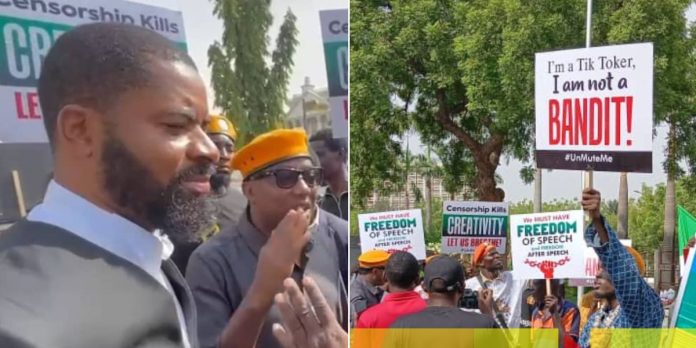Despite warnings from the Nigeria Police Force, Nigerian youths on Monday stormed the streets of Lagos, Abuja, Port Harcourt, and other major cities in a wave of coordinated protests against what they described as growing authoritarianism and worsening economic conditions.
The nationwide protest, led by the Take-It-Back Movement and several civil society organisations, drew attention to pressing national issues, including the alleged abuse of the Cybercrime Act, inflation, insecurity, and political instability—particularly the crisis rocking Rivers State.
In Lagos, demonstrators were seen in Ikeja, chanting slogans and carrying placards with inscriptions such as “Stop the Repression” and “Let Us Breathe.” The protest also spread to Abuja, where youths gathered in Maitama before being dispersed by police officers who fired teargas into the crowd.
Port Harcourt witnessed a similar scene as protesters defied security warnings and converged at Isaac Boro Park. However, the peaceful rally quickly turned chaotic after security operatives launched tear gas at the crowd. Undeterred, protesters voiced their frustrations, insisting they had a constitutional right to peaceful assembly.
“We are not here for violence. We just want our voices heard. We have no functioning government in Rivers State right now,” one protester told journalists, referencing the suspension of Governor Siminalayi Fubara and what they called an unconstitutional administration.
Prominent activist and former presidential candidate, Omoyele Sowore, was also seen at the protest ground in Abuja, showing solidarity with the demonstrators.
Reacting to the protest, the police had earlier described the planned action as “ill-conceived and mischievous,” urging organisers to cancel it in light of the National Police Day celebration. But the Take-It-Back Movement’s National Coordinator, Juwon Sanyaolu, dismissed the warning, accusing the authorities of suppressing dissent and ignoring the suffering of ordinary Nigerians.
“The aim of this protest is simple—to resist authoritarian rule and demand immediate relief for Nigerians grappling with hunger, insecurity, and economic despair,” Sanyaolu said in a statement.
As the dust settles from Monday’s protest, the message from the streets remains loud and clear: young Nigerians are demanding accountability, transparency, and leadership that truly serves the people.



